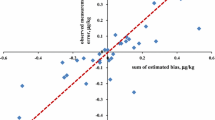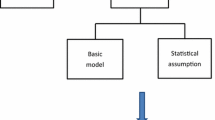Abstract
The general principle of using data collected during proficiency testing (PT) for the additional purpose of assessing method performance is discussed. Particular attention is paid to the similarities and differences in conduct of traditional interlaboratory method performance studies and proficiency testing. Recommendations are made for implementing PT-based method performance studies, including statistical assessment of the data. It is concluded that, properly implemented, PT-based method performance study provides essentially equivalent information to that obtained from traditional collaborative study and may be used in appraising candidate methods with a view to their adoption as standard methods.
Similar content being viewed by others
References
Thompson M, Ellison SLR, Wood R (2006) The international harmonized protocol for the proficiency testing of analytical chemistry laboratories (IUPAC technical report). Pure Appl Chem 78:145–196
ISO/IEC Guide 43-1:1997 (1997) Proficiency testing by interlaboratory comparisons—Part 1: Development and operation of proficiency testing schemes. International Organization for Standardization, Geneva
Boley N (1998) Accred Qual Assur 3:459–461
Thompson M, Owen L, Wilkinson K, Wood R, Damant A (2002) Analyst 127:1666–1668
Thompson M, Owen L, Wilkinson K, Wood R, Damant A (2004) Meat Sci 68:631–634
Shinton NK, England JM, Kennedy DA (1982) J Clin Pathol 35:1095–1102
Dawson DW, Fish DI, Frew ID, Roome T, Tilston I (1987) J Clin Pathol 40:393–397
Poller L (1989) J Clin Pathol 42:1–3
Thompson M, Ellison SLR, Wood R (2002) Harmonized guidelines for single-laboratory validation of methods of analysis. Pure Appl Chem 74:835–855
ISO 5725:1994 (1994) Accuracy (trueness and precision) of measurement methods and results. International organization for standardization, Geneva
Horwitz W (1995) Protocol for the design, conduct and interpretation of method performance studies Pure Appl Chem 67:331–343
Horwitz, W (1994) Nomenclature of interlaboratory analytical studies (IUPAC Recommendations 1994). Pure Appl Chem 66:1903–1911
Feldsine P, Abeyta C, Andrews WH (2002) J AOAC Int 85:1187–1200
Thompson M, Lowthian PJ (1995) Analyst 120:271–272
Analytical Methods Committee (1989) Analyst 114:1693–1697
Analytical Methods Committee (1989) Analyst 114:1698–1702
ISO 13528:2005 (2005) Statistical methods for use in proficiency testing by interlaboratory comparisons. International Organization for Standardization, Geneva
Thompson M (2000) Analyst 125:385–386
Author information
Authors and Affiliations
Consortia
Additional information
This report was developed by S.L.R. Ellison (LGC Limited), M. Thompson (University of London), D. Westwood (Environment Agency National Laboratory Service) and R. Wood (Food Standards Agency) for the Statistical Subcommittee and approved by the Analytical Method Committee.
Rights and permissions
About this article
Cite this article
Analytical Method Committee, The Royal Society of Chemistry. The role of proficiency testing in method validation. Accred Qual Assur 15, 73–79 (2010). https://doi.org/10.1007/s00769-009-0560-5
Received:
Accepted:
Published:
Issue Date:
DOI: https://doi.org/10.1007/s00769-009-0560-5




